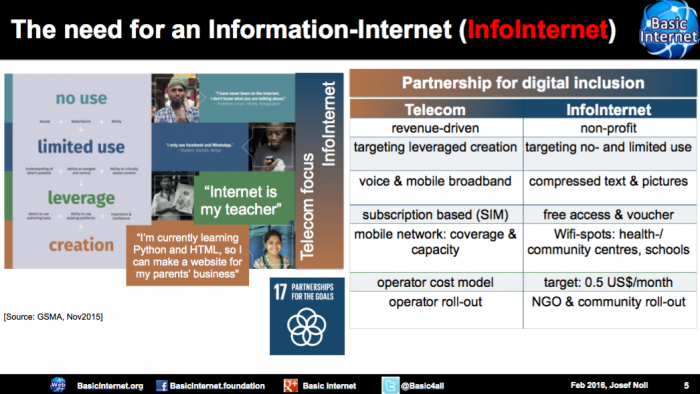InfoInternet - Internet lite for all
| Wiki for ITS | ||||||
|---|---|---|---|---|---|---|
|
Keyword InfoInternet
(edit page)
InfoInternet is the standard for Internet Lite for all, the free access to text and pictures, as well as local videos, as bearers of information.
Free access to information (i.e. text and pictures) is the catalyst for the Sustainable Development Goals (SDGs) of the Agenda 2030. The direct focus is on target 9.C focussing a.o. on affordable access to the Internet, which is directly addressed through the InfoInternet standard. Our expectation is that free access to information is a basis for digital health in SDG 3, digital information for education in SDG 4, and digital jobs and economic growth in SDG 8. Free digital information access will thus become a strong contributor in reducing inequalities (SDG 10), and make human settlements inclusive (SDG 11).
Combining free access to information with paid access to amusement (i.e. video, gaming, other streaming) creates a sustainable business model for mobile operators and Internet Service Providers (ISPs). InfoInternet targets people, who have less than 3 US$/day. Enabling the walk on the Internet through InfoInternet is a way of reaching the people at the bottom of the pyramid, and is the entry door to inclusion in the digital society.
The provision of InfoInternet is complementary to mobile operators, focussing on customers with higher ability to pay. In combination, providing InfoInternet as part of the mobile network will empower people and base their way to members of the digital society.
Application areas for Internet Lite for all are addressing:
- the need for information access regardless of the subscription
- a network slice for emergency operations, focus on information
Examples of the InfoInternet are the implementation made by the Basic Internet Foundation through the DigI project. Discussions are ongoing on the implementation of the standard, being
- a protocol like https://basicinternet.info&standard=InfoInternet
- a proxy as used by googleweblight.com or opera proxy
- the amp format used by Google for news caching
Suggestion: use the United Nations Platform to provide amp format
- AMP — which stands for Accelerated Mobile Pages — was introduced by Google in October of 2015. AMP is an open-source custom web development framework created to speed up the loading time of web pages on mobile devices. Read more at: https://devopedia.org/accelerated-mobile-pages
Current implementation is through White Lists or Black Lists (see DigI:TI1.1#Content_filtering for details). Further aspects on White List filtering for access are addressed here.
The InfoInternet can also be used for IoT devices to connect to and be integrated into a home network, see Masterthesis on Device Integration into the Home Network.
Contains pages with keyword "InfoInternet".
Related information
| Thumb | Title | Keywords | Date | Author/Project |
|---|---|---|---|---|
 |
Basic Internet Foundation: Digital Inclusion Click to Open Forum for Teknologi og Utvikling - Tekna |
Basic Internet, InfoInternet, Visjon2030 | 4 April 2019 | Wisam Ahmed Mansour |
 |
Internet light for All - fostering the Agenda 2030 Click to Open Master in 5G free access to information |
InfoInternet, Agenda 2030, Agenda 2030 | 5 December 2017 | Josef Noll |
 |
InfoInternet:
Free Access to Information for All Click to Open Global Health Master Oct2017 |
Digital Inclusion, InfoInternet | 25 October 2017 | Josef Noll |
 |
Why? Non-Discriminating Access to Digital Information Click to Open DigI Inception Meeting Sep2017 |
DigI, InfoInternet, Basic Education | 14 September 2017 | Josef Noll |
- Basic Internet Feedback to Malta keynote (Feedback to Malta keynote on Basic Internet (Fxx))
- 5G Network Slicing for Free Access to Information (Keywords Basic Internet, InfoInternet, Network slicing, SCOTT, Agenda 2030, Agenda 2030, Digital Inclusion)
- Education and Health through InfoInternet (Keywords Basic Internet, InfoInternet)
- Integrating Energy Devices through BasicInternet (Keywords IoT, Smart home, Wi-Fi, Cellular, Client-server model, IoT security, Risk analysis, Client authentication, InfoInternet)
- Rozina Dongol (works at: Ifi, with topics: Business Modelling, Wireless networks, Mobile networks, InfoInternet)
